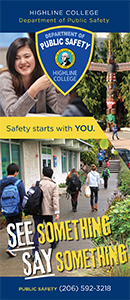Sexual Assault Policy and Prevention
Highline College prohibits rape, acquaintance rape, domestic violence, dating violence, sexual assault, and stalking for all students and employees. Rape and all forms of sexual assault and misconduct are violations of Highline’s Code of Student Conduct and the Revised Code of Washington (RCW) 49.60.030.
Education and Prevention Programs
The College engages in educational programs to prevent domestic violence, dating violence, sexual assault and stalking. Educational programs consist of primary prevention and awareness programs for all incoming students and new employees and ongoing awareness and prevention campaigns for students and faculty that:
- Identifies domestic violence, dating violence, sexual assault and stalking as prohibited conduct;
- Defines what behavior constitutes domestic violence, dating violence, sexual assault, and stalking;
- Defines what behavior and actions constitute consent to sexual activity in the State of Washington.
- Provides safe and positive options for bystander intervention that may be carried out by an individual to prevent harm or intervene when there is a risk of domestic violence, dating violence, sexual assault, or stalking against a person other than the bystander;
- Provides information on risk reduction so that students and employees may recognize warning signs of abusive behavior and how to avoid potential attacks.
- Provides an overview of the information contained in the Annual Security Report in compliance with the Clery Act.
VAWA Related Training and Awareness Campaigns
| Training | Department | Date |
|---|---|---|
| Clothesline (Art projects that share empowering messages for women victims of violence) | Women's Programs | Early October (Domestic Violence Awareness Month) |
| Domestic Violence Presentation (by YMCA) | Women's Programs | Fall Quarter |
| Domestic Violence 101 | Women's Programs | Early October (Domestic Violence Awareness Month |
The College has developed an annual educational campaign consisting of presentations that include distribution of educational materials to new students; often participating in several College-wide events throughout the year; presenting programs throughout the year that focus on domestic violence, dating violence and sex trafficking, including sessions such as: clothesline projects, a speaker series, and an annual marketing series.
Sexual Assault Response
In the event of sexual assault, notify Public Safety at extension 3218 or 3219 and/or the police at 911. Every effort should be made to preserve any physical evidence of such assault. Students may contact the Counseling Center or Women’s Programs for non-urgent support services. Off-campus help is available from the King County Sexual Assault Resource Center 24 hour crisis line 425-226-7273 or Seattle Rape Relief, 24 hour crisis line 206-632-7273. Other off-campus help is also available.
Highline will make any reasonable changes in a student’s academic situation as part of its assistance.
Both accusers and accused are protected by the Student Conduct Code. This code describes the disciplinary process of the college. Both accuser and accused have the same opportunities to have others present during any hearing before the Student Conduct Committee, including the right to counsel and cross-examination. The results of any such hearing, including final disposition and sanctions may include: warning, probation, suspension, restraining or no-contact orders, or dismissal.
Sex Offender Registry and Access to Related Information
The federal Campus Sex Crimes Prevention Act, enacted on October 28, 2000, went into effect October 28, 2002. The law requires institutions of higher education to issue a statement advising the campus community where law enforcement agency information provided by a State concerning registered sex offenders may be obtained.
Information that is relevant and necessary to protect the public and to counteract the danger created by a particular offender is released pursuant to RCW 4.24.550.
The King County Sheriff’s Office maintains an online registry of Level 2 and 3 sex offenders who are registered to live in King County. You can search for offenders by zip code or by an offender’s name.
Washington State Law permits notifications about Level III offenders that include relevant, accurate and necessary information. This information MAY BE disclosed to the public at large.
Sex Offender Related Links:
- Highline’s Notification of Registered Sex Offender Policy & Procedures
- King County Sex Offender Search
- Washington Association of Sheriffs & Police Chiefs (WASPC)
- Revised Code of Washington state – RCW 9A.44.130 and RCW 4.24.550 Community Notification


